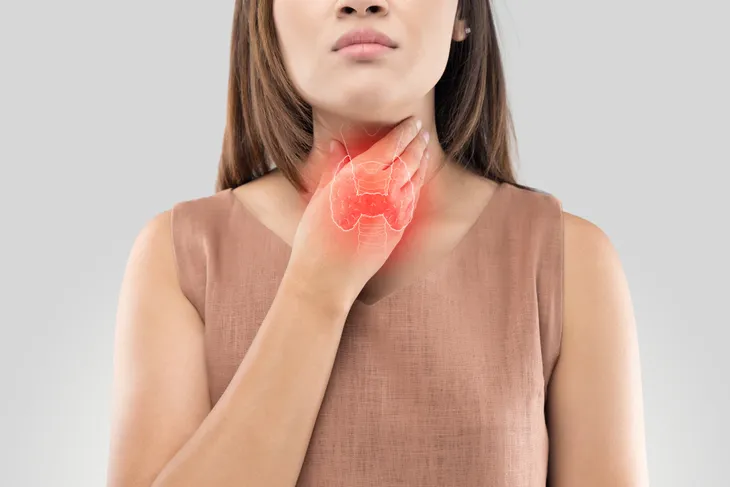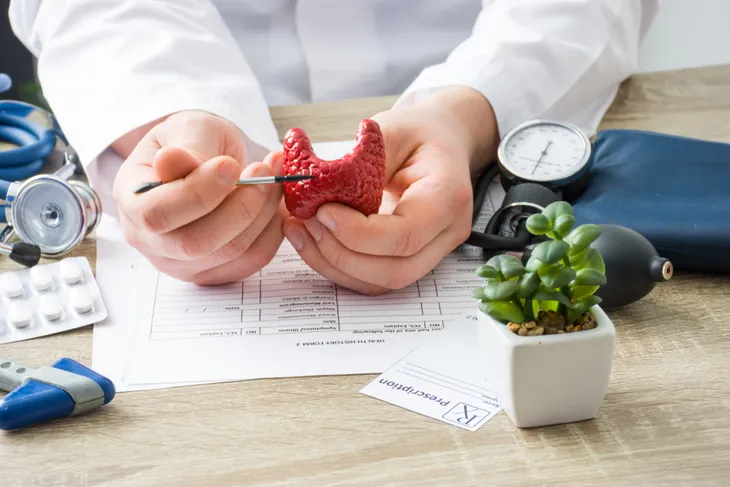- Hypothyroidism can occur when the thyroid gland doesn’t make enough hormones.
- Symptoms include weight gain, fatigue, feeling cold, depression, and hair loss.
- Blood tests can help doctors diagnose the condition and prescribe medication.
- Thyroid medication is designed to restore the hormone levels your body needs.
The thyroid is a small gland located in the front of the neck. It’s responsible for releasing hormones that play an important role in regulating body functions. When the thyroid is underactive, it doesn’t release enough hormones to meet your body’s needs.
Let’s take a closer look at underactive thyroid disease, commonly known as hypothyroidism, to help you recognize the signs and symptoms. We’ll also cover causes, treatments, and the risks of untreated hypothyroidism.
What Is Hypothyroidism?
Hypothyroidism, a common thyroid disorder, occurs when your thyroid gland doesn’t produce enough thyroid hormones. Thyroid hormones help regulate your metabolism. If your thyroid gland doesn’t release enough of these crucial hormones, then your body makes less energy, and your metabolism slows down.
Your metabolism plays an important role in several body functions. For instance, it affects your heart rate, body temperature, as well as how many calories you burn a day. Eventually, untreated hypothyroidism can lead to several health problems, including heart disease and depression.
Common Symptoms: Fatigue and Weight Gain
Since hypothyroidism affects everyone differently, the signs and symptoms vary from one person to the next. That said, there are two incredibly common side effects: unexplained fatigue and weight gain. When thyroid levels are low, your energy levels drop, and your metabolism stores more calories as fat.
So, those with an underactive thyroid may routinely feel exhausted despite getting enough sleep (7 or more hours). By the same token, someone with hypothyroidism might gain weight even though nothing about their activity levels or diet changes.
Other Symptoms of Hypothyroidism
Beyond fatigue and weight gain, other symptoms include:
- Constipation
- Depression
- Dry, itchy skin
- Feeling cold
- Hair loss
- Impaired memory
- Joint pain
- Menstrual cycle changes
- Muscle aches
- Puffy face
Symptoms tend to become gradually more pronounced as the thyroid slows down. As a result, it can take years for changes to become noticeable. Additionally, many of these symptoms are commonly associated with aging. So, many people may not suspect a thyroid problem until several symptoms emerge.
When To See a Doctor
If you’re experiencing unexplained fatigue or weight gain, then you should talk with your doctor. Also, reach out to your doctor if you notice other symptoms of hypothyroidism, including those related to your appearance, like hair loss, and those related to your mental wellness, like depression.
After discussing your symptoms and conducting a physical exam, your doctor might order blood tests to check your hormone levels. In some cases, your doctor may also order a thyroid ultrasound to check for inflammation.
What Causes Hypothyroidism?
Hashimoto’s disease is the most common cause of hypothyroidism, according to the National Institute of Diabetes and Digestive and Kidney Diseases (NIDDK). Hashimoto’s disease is an autoimmune disorder that causes the immune system to attack the thyroid. Subsequently, the thyroid becomes inflamed and doesn’t function properly.
Other causes of hypothyroidism include thyroid surgery, radiation therapy, some medications, and congenital thyroid issues. While hypothyroidism often develops later in life, infants can experience it. Congenital hypothyroidism occurs when an infant is born with a defective thyroid gland or without one entirely.
Infants, Children, and Teens
At first, infants born with congenital hypothyroidism might not exhibit symptoms. According to the Mayo Clinic, symptoms that can emerge include breathing difficulties, hoarse crying, jaundice, a protruding tongue, and an umbilical hernia. Over time, hypothyroidism may interfere with the infant’s growth and development.
Since untreated congenital hypothyroidism can lead to physical and intellectual disabilities, many states perform a thyroid test on newborns. Hypothyroidism can also develop in childhood and adolescence. For the most part, children and teens experience similar symptoms as adults. However, the Mayo Clinic notes a few symptoms unique to minors, including stunted growth, delayed puberty, and slow mental development.
Risk Factors of Hypothyroidism
According to NIDDK, women are more likely to develop hypothyroidism than men. In fact, the Office on Women’s Health (OWH) says 1 in 8 women experiences thyroid problems at some point in their life.
Aging is another known risk factor. The Mayo Clinic says people over 60-years old are more likely to have hypothyroidism, and OWH similarly says the condition is more likely to occur after menopause. Other risk factors include having an autoimmune disease or a family history of hypothyroidism.
Diagnosing Hypothyroidism
Your doctor will likely use a combination of methods to diagnose hypothyroidism. For instance, they’ll want to discuss the symptoms that make you suspect hypothyroidism. It’s also likely they’ll want to review your medical history as well as your family’s medical history. Additionally, your doctor will likely conduct a physical exam to check your thyroid gland.
Then if your doctor also thinks you could have hypothyroidism, the American Thyroid Association says there are two blood tests they might order: TSH and T4 tests. These blood tests can help your doctor assess your hormone levels. According to Healthline, hypothyroidism typically involves a high level of TSH and a low level of T4. Additionally, your doctor might order a thyroid ultrasound to help rule out other thyroid conditions and make a proper diagnosis.
Treatments for Hypothyroidism
Hypothyroidism is a lifelong condition, but thyroid medications can help manage symptoms. NIDDK says medications for the condition are designed to replace the hormones your thyroid struggles to make. As soon as adequate hormone levels are restored, symptoms become more manageable and may disappear entirely.
Your doctor will likely order a follow-up blood test to monitor your progress. At this point, your doctor may adjust your dosage. After any dosage change, your doctor will likely follow up with another blood test. It may take some time, but your doctor will work with you to find the appropriate dose and treatment plan.
Hypothyroidism-Friendly Foods
Some foods have nutrients that can help support thyroid function. For instance, notable nutrients include omega-3 fatty acids, selenium, zinc, and iodine. Hypothyroidism-friendly foods like fish, nuts, and seaweed have at least one or more of these important nutrients.
While changing your diet won’t cure hypothyroidism, a balanced diet of nutrient-rich foods can help make you feel better by boosting energy levels and improving thyroid health. Before making changes to your diet, consult with your doctor. They can help you develop a diet that works in conjunction with any prescribed medication.
More Lifestyle Changes That Can Help
In addition to considering dietary changes, other lifestyle changes can also make a difference. For one thing, WebMD says making time for rest and relaxation is essential. The source recommends following a regular sleep schedule with a 30-minute relaxation block before bedtime. For example, you could use that time to drink a cup of tea or read a good book.
WebMD says moderate exercise can also help manage symptoms of hypothyroidism, including low energy levels and weight gain. However, the source notes the importance of easing into regular physical activity. Since an underactive thyroid can slow your heart rate, talk to your doctor about how much low-impact exercise they recommend.
Complications of Hypothyroidism
If left untreated, hypothyroidism can lead to several health complications. According to the Mayo Clinic, complications include:
- Goiter
- Heart problems
- Mental health issues
- Peripheral neuropathy
- Myxedema
Myxedema is severely advanced hypothyroidism that can develop if the condition goes untreated. The Mayo Clinic says it’s a rare but life-threatening complication. According to the source, symptoms include “intense cold intolerance and drowsiness followed by profound lethargy and unconsciousness.”
Fortunately, thyroid medication can help manage hypothyroidism. If you think you could have an underactive thyroid, contact your doctor. They can help you develop a treatment plan after making a diagnosis.















